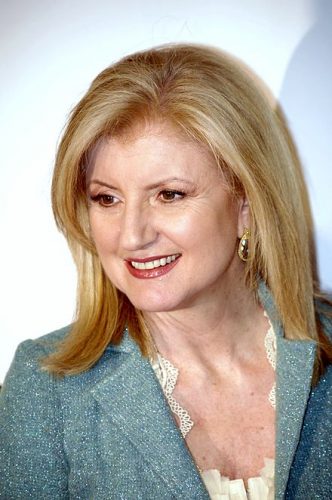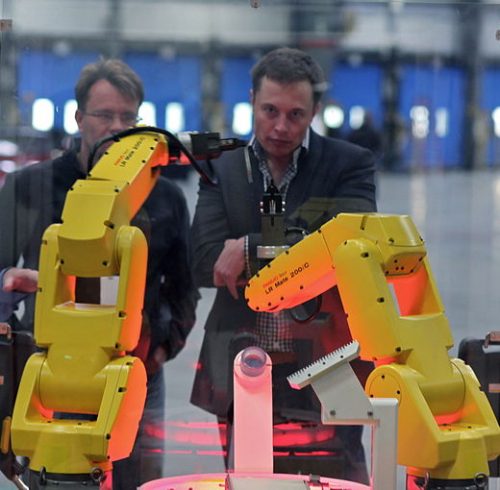 In an interview with the New York Times on August 16, the visionary technologist Elon Musk described the grueling work schedule he forces himself to endure in order to achieve his goals. He rarely takes any significant time away from work, and when he does, it’s often for exotic vacations requiring long travels. Recently he has been working up to 120 hours a week at his Tesla automobile plant, never going outside the factory for days at a time. He keeps a sleeping bag in his office, and when he does decide to try getting some shut-eye, he apparently makes frequent use of strong sleep-inducing medications.
In an interview with the New York Times on August 16, the visionary technologist Elon Musk described the grueling work schedule he forces himself to endure in order to achieve his goals. He rarely takes any significant time away from work, and when he does, it’s often for exotic vacations requiring long travels. Recently he has been working up to 120 hours a week at his Tesla automobile plant, never going outside the factory for days at a time. He keeps a sleeping bag in his office, and when he does decide to try getting some shut-eye, he apparently makes frequent use of strong sleep-inducing medications.
Musk is a very prominent public figure and a true leader in creating the technologies of the future. As such, his words carry great weight and influence. It matters when Elon Musk says that his professional success requires a chronic state of sleep deprivation.
The interview prompted the sleep advocate Arianna Huffington to post an open letter to Musk on her Thrive.com website on August 17. Huffington praised Musk’s intellectual brilliance, and she appealed to that same scientific mentality to recognize that healthy sleep is a vital element in true creativity:
You’re a science and data-driven person. You’re obsessed with physics, engineering, with figuring out how things work. So apply that same passion for science not just to your products but to yourself. People are not machines. For machines — whether of the First or Fourth Industrial Revolution variety — downtime is a bug; for humans, downtime is a feature. The science is clear. And what it tells us is that there’s simply no way you can make good decisions and achieve your world-changing ambitions while running on empty. It doesn’t depend on how many hours you’re awake. Tesla — and the world (not to mention you and your beautiful children) — would be better off if you regularly built in time to refuel, recharge and reconnect with your exceptional reserves of creativity and your power to innovate. Working 120-hour weeks doesn’t leverage your unique qualities, it wastes them. You can’t simply power through — that’s just not how our bodies and our brains work. Nobody knows better than you that we can’t get to Mars by ignoring the laws of physics. Nor can we get where we want to go by ignoring scientific laws in our daily lives.

This prompted Musk to respond on August 18 at 2:32 a.m. via Twitter:
Ford & Tesla are the only 2 American car companies to avoid bankruptcy. I just got home from the factory. You think this is an option. It is not.
The tweet was removed a few hours later, but Huffington saw it and responded in an interview on August 20 by trying again to appeal to his own highest ideals:
This is not [just] about sleep, or about slowing down, or about asking Elon to chill out under a mango tree. It’s about how we can unlock and sustain our peak performance, and see solutions and opportunities where others can’t.
Those are precisely the virtues that Musk takes pride in having—a capacity for peak performance and visionary problem-solving. Huffington is gently but firmly suggesting that if he truly wants to strengthen those abilities, then he must give up the false heroism of denying his body’s need for sleep, rest, and recuperation. Chronic sleep deprivation takes your mind and body in exactly the opposite direction, towards degraded functioning in our most important human faculties. The empirical research on the negative effects of sleep deprivation is very clear on this point. Yet Musk remains in thrall to an unscientific attitude about the need to sacrifice sleep as the price of success.

Is that too harsh a conclusion? Perhaps, but it seems more plausible following another article in the NYT, on August 28. This one focused on the increasing number of problems at the Tesla factory, many of them caused by Musk’s own mercurial behavior. More than 30 senior executives have left the company in recent years, citing his excessive micro-management, and the factory’s automated systems have suffered a never-ending stream of technical glitches, which he insists on fixing himself. The Tesla factory was designed for maximal automation and minimal human involvement, and it seems that Musk is slowly but surely imposing that same design on himself.
Musk’s defense of his sleep-starved life highlights an often overlooked research finding that I believe has alarming implications for public health and civil society. Below is an adapted quote from my 2016 book, Big Dreams. First, a general litany of the effects of sleep deprivation:
For humans the first signs of sleep deprivation are unpleasant feelings of fatigue, irritability, and difficulties concentrating. Then come problems with reading and speaking clearly, poor judgment, lower body temperature, and a considerable increase in appetite. If the deprivation continues, the worsening effects include disorientation, visual misperceptions, apathy, severe lethargy, and social withdrawal.
Now comes the lesser known and more worrisome impact:
Surprisingly, even with these worsening deficits, sleep-deprived humans can still perform remarkably well on tests for certain kinds of repetitive motor and cognitive skills. These abilities remain functional even when people no longer have any imaginative spark or feel actively engaged with the world. According to sleep researcher Michael H. Bonnet, “responses [to performance tests] during sleep loss may occur as rapidly as before, but those responses tend to be more stereotyped and less creative.” Another researcher, Jim Horne, put it like this: “in effect, progressive sleep loss turns us into automatons and, in losing the ability to think independently, conscious awareness of ourselves is impaired and we are no longer prescient. Nevertheless, we can still run on ‘auto-pilot’ and perform routine behavior and other well-rehearsed tasks and procedures.” According to Horne, “Recent findings with clinically oriented neuropsychological tests suggest that one night without sleep causes particular impairment to tasks requiring flexible thinking and the updating of plans in the light of new information… [S]leep deprivation led to more rigid thinking, increased perseverative errors, and marked difficulty in appreciating an updated situation.”
In other words, people who are chronically sleep deprived can still perform routine, automatic, stereotyped behaviors. But they lose the ability to be innovative, adaptive, flexible, and capable of learning. They become less like humans, and more like robots. They can remain functional workers, but they are no longer creative people.
Is that really the path we want to follow, as individuals and a society?
